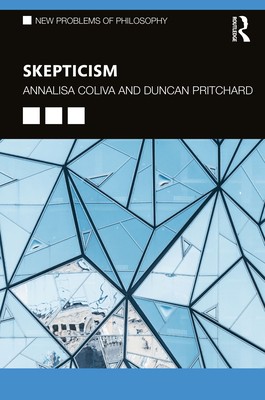
- We will send in 10–14 business days.
- Author: Annalisa Coliva
- Publisher: Routledge
- ISBN-10: 0367178354
- ISBN-13: 9780367178352
- Format: 15.2 x 23.2 x 1.6 cm, softcover
- Language: English
- SAVE -10% with code: EXTRA
Reviews
Description
Skepticism is one of the perennial problems of philosophy: from antiquity, to the early modern period of Descartes and Hume, and right through to the present day. It remains a fundamental and widely studied topic and, as Annalisa Coliva and Duncan Pritchard show in Skepticism, it presents us with a paradox with important ramifications not only for epistemology but also for many other core areas of philosophy.
This book provides a thorough grounding in contemporary debates about skepticism, exploring the following key topics:
- the core skeptical arguments, with a particular focus on Cartesian and Humean radical skepticism
- the epistemic principles that are held to underlie skeptical arguments, such as the Closure and Underdetermination principles
- the content externalism of Putnam, Davidson, and Chalmers, and how it might help us respond to radical skepticism
- the epistemic externalism/internalism distinction and how it relates to the skeptical problematic
- contextualism in epistemology and its anti-skeptical import
- the various interpretations of a Wittgensteinian hinge epistemology
- the viability of epistemological disjunctivism, including whether it can be combined with hinge epistemology as part of a dual response to radical skepticism
- liberal and conservative responses to the Humean skeptical paradox.
Both authors are prominent figures who work on skepticism, and so one novelty of the book is that it provides an insight into their own contrasting responses to this philosophical difficulty. With the addition of annotated further reading and a glossary, this is an ideal starting point for anyone studying the philosophy of skepticism, along with students of epistemology, metaphysics, and contemporary analytic philosophy.
EXTRA 10 % discount with code: EXTRA
The promotion ends in 15d.22:15:09
The discount code is valid when purchasing from 10 €. Discounts do not stack.
- Author: Annalisa Coliva
- Publisher: Routledge
- ISBN-10: 0367178354
- ISBN-13: 9780367178352
- Format: 15.2 x 23.2 x 1.6 cm, softcover
- Language: English English
Skepticism is one of the perennial problems of philosophy: from antiquity, to the early modern period of Descartes and Hume, and right through to the present day. It remains a fundamental and widely studied topic and, as Annalisa Coliva and Duncan Pritchard show in Skepticism, it presents us with a paradox with important ramifications not only for epistemology but also for many other core areas of philosophy.
This book provides a thorough grounding in contemporary debates about skepticism, exploring the following key topics:
- the core skeptical arguments, with a particular focus on Cartesian and Humean radical skepticism
- the epistemic principles that are held to underlie skeptical arguments, such as the Closure and Underdetermination principles
- the content externalism of Putnam, Davidson, and Chalmers, and how it might help us respond to radical skepticism
- the epistemic externalism/internalism distinction and how it relates to the skeptical problematic
- contextualism in epistemology and its anti-skeptical import
- the various interpretations of a Wittgensteinian hinge epistemology
- the viability of epistemological disjunctivism, including whether it can be combined with hinge epistemology as part of a dual response to radical skepticism
- liberal and conservative responses to the Humean skeptical paradox.
Both authors are prominent figures who work on skepticism, and so one novelty of the book is that it provides an insight into their own contrasting responses to this philosophical difficulty. With the addition of annotated further reading and a glossary, this is an ideal starting point for anyone studying the philosophy of skepticism, along with students of epistemology, metaphysics, and contemporary analytic philosophy.


Reviews